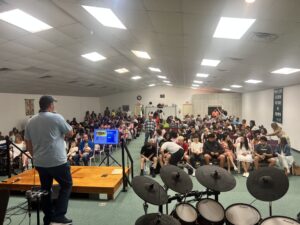
WASHINGTON (BP)–The Senate failed Sept. 29 to approve a bill to outlaw interstate abortions on minors without parental notice when eight Democrats switched positions to support their party leadership’s obstruction of the measure.
The Senate voted 57-42 to overcome a Democratic procedural maneuver blocking passage of the bill, but the majority fell three votes short of the 60 needed under the rules. The Senate had passed a similar measure with a 65-34 vote in July, but eight of 14 Democrats who voted for that bill refused this time to support moving the new version to the floor.
Pro-life advocates were displeased but not surprised.
“Unfortunately, this is politics as usual,” said Richard Land, president of the Southern Baptist Ethics & Religious Liberty Commission. “Senators vote for parental notification; then they turn around and vote against ending debate to have a final vote. That way, they can say to pro-lifers they voted for it and they can say to pro-choicers they voted against ending the filibuster. And politicians wonder why they get a reputation for being two-faced.”
The Democratic minority “preserved the ability of profiteering abortionists to keep parents in the dark,” said Douglas Johnson, the National Right to life Committee’s legislative director. “It is remarkable that only six out of 45 Democrats voted to require a parent to be notified before an abortion is performed on a young daughter in some other state.”
The eight Democrats who switched sides by voting against bringing the bill to the floor were Sens. Evan Bayh, Indiana; Tom Carper, Delaware; Kent Conrad and Byron Dorgan, both of North Dakota; Daniel Inouye, Hawaii; Herb Kohl, Wisconsin; Bill Nelson, Florida; and Ken Salazar, Colorado.
The House of Representatives had passed the latest version in a 264-153 vote Sept. 26. The House had included in the substitute measure all of the language approved previously by the Senate in an effort to gain passage.
The Democratic block on the legislation began when the Senate passed a version of the bill that differed from one approved by the House in 2005. Both measures were intended to prevent the transportation of underage girls across state lines to obtain abortions in avoidance of parental involvement laws in the girls’ home states.
After Senate passage July 25, Majority Leader Bill Frist moved for the bill to go to a conference committee, where differences between it and the House measure could be reconciled. Sen. Richard Durbin, D.-Ill., the assistant minority leader, objected to the normally routine request, thereby halting the advance of the bill. Twice more, the Democrats blocked the bill’s progress by objecting.
House supporters acted in an attempt to break the blockage by including in the substitute, known as the Child Interstate Abortion Notification Act (S. 403), a Senate provision that bars a father who impregnates his daughter from taking her to another state for an abortion or from suing a person who provides such transportation. The substitute also maintained a House requirement that an abortion doctor in a state without a parental involvement law inform a parent before he performs an abortion on a minor girl who lives in a different state.
The six Democrats who voted in July for the bill and also supported bringing it to the floor Sept. 29 were Sens. Harry Reid, Nevada; Robert Byrd, West Virginia; Tim Johnson, South Dakota; Mary Landrieu, Louisiana; Ben Nelson, Nebraska; and Mark Pryor, Arkansas.
Reid, the Senate minority leader, supported the measure in both votes but refused to halt the Democrats’ obstruction of the legislation.
Four of the Senate’s 55 Republicans voted against ending the Democratic delay. They were Sens. Lincoln Chafee, Rhode Island; Susan Collins and Olympic Snowe, both of Maine; and Arlen Specter, Pennsylvania.
Some minors travel from or are transported from states with parental involvement laws to neighboring states that have no such laws in order to undergo abortions. Abortion clinics in states without parental consent or notification laws sometimes advertise their services in adjacent states that have such laws.
Some studies have shown a majority of minors who become pregnant are impregnated by men 18 or older. The men, or their family members, sometimes take the minors across state lines to obtain abortions. Supporters of the proposals to ban such activities argue that these men have an incentive to keep the pregnancy hidden by means of secret abortions, since they are vulnerable to statutory rape charges.
There are 29 states that have effective parental involvement laws that are not being blocked by courts, according to NRLC.
NARAL Pro-choice America, the National Abortion Federation and Planned Parenthood Federation of America are among the abortion rights organizations that fought passage of the measure.
The ERLC sent out an alert Sept. 27 calling for its constituents to contact their senators urging them to vote for S. 403.
S.D. BAN TRAILS –- A new public opinion survey shows support for a statewide ban on abortions trails among South Dakota voters.
A Zogby International survey of more than 500 likely voters Sept. 20 found 44 percent favored the referendum, while 47 opposed it, according to LifeNews.com. That is a 5 percent improvement from a July survey by Mason-Dixon Polling and Research that showed support for the prohibition trailing 49-39 percent.
Leslee Unruh, manager of the Vote Yes for Life campaign in support of the ban, said, “The momentum is with the Vote Yes campaign, and we are just getting started.”
Democratic Sen. Tim Johnson of South Dakota has thrown his influence behind the anti-ban effort. He recorded an automated telephone message that began reaching voters Sept. 26. In it, Johnson called the ban “an extreme and radical approach to a very difficult and personal subject,” according to the Sioux Falls (S.D.) Argus Leader.
The referendum is on a law enacted in March that prohibits abortion except when the mother’s life is endangered. It is the most expansive restriction on abortion since the U.S. Supreme Court struck down all state bans and legalized the practice in the 1973 Roe v. Wade decision.
Even if voters affirm the law in the election, opponents are expected to take it to court.
FORCED PRISON ABORTION -– A new report says there are eyewitness accounts to female inmates in North Korea being forced to have abortions.
The Korean Bar Association reported 58 percent of defectors it interviewed said they saw or heard about coerced abortions on pregnant women in North Korean prisons, according to The Korea Times. The report was based on two years of research, including interviews with about 100 North Korean defectors.
The report was not surprising. Forced abortions on inmates, as well as infanticide outside prisons, have been reported previously from the world’s most closed country.
In March, a North Korean doctor said the communist country is remarkably free of physically impaired people, because they are quickly eliminated. At a forum in Seoul, South Korea, Ri Kwang-choi said babies with physical disabilities are put to death in hospitals or homes and soon buried, according to the Reuters news service. The regime of dictator Kim Jong Il promotes killing such infants, Kwang-choi said.
–30–















